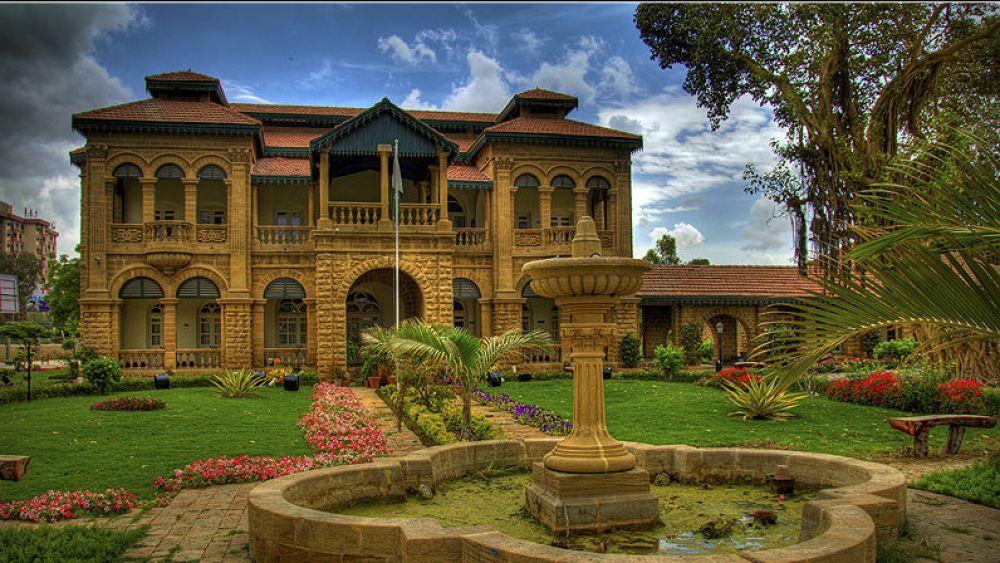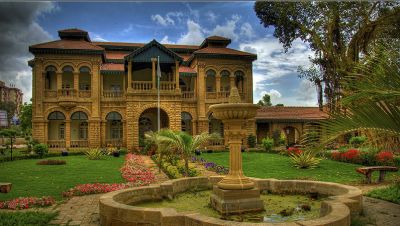

Delve into the rich history of Quaid-e-Azam, Muhammad Ali Jinnah, the father of the nation of Pakistan, with a comprehensive guided tour of the Flagstaff House Museum in Karachi. This tour offers visitors the opportunity to explore the residence where Quaid-e-Azam spent the last few years of his life. The house, which has now been converted into a museum, is filled with memorabilia and personal belongings of the great leader. As you walk through the rooms, your guide will share stories and anecdotes about his life, his struggle for Pakistan's independence, and his vision for the nation. You will also gain insight into the history of the period, viewing historical documents, photographs, and state gifts. The colonial architecture of the house itself is a testament to the history it has witnessed. This activity is a must for history buffs and for those wanting to understand the roots and heritage of Pakistan.
Photography enthusiasts are in for a treat at the Quaid-e-Azam House Museum. The museum, set in the historic Flagstaff House, offers a perfect canvas for architectural photography with its well-preserved colonial structure. Participants can capture stunning shots of the building's exterior, its classic façade, and the intricate details that speak volumes of the pre-independence era. The sprawling lawns and the vintage ambiance make for picturesque backdrops. Inside, with permission, photographers can snap the evocative interiors and the numerous artifacts that adorn the rooms. The play of light through the colonial windows creates an atmosphere that is both challenging and rewarding to capture. This is an excellent opportunity for both amateur and professional photographers to hone their skills and perhaps document their experience in one of Pakistan's most historical settings.
The Quaid-e-Azam House Museum serves as an excellent educational excursion for school students. It provides a tangible connection to Pakistan's national history and heritage. During the visit, students can engage with the life and times of Muhammad Ali Jinnah through a curated educational tour. They will witness firsthand the personal belongings of Quaid-e-Azam, such as his clothes, furniture, and books, which remain preserved in the museum. The trip is aimed to be interactive and informative, encouraging students to ask questions and participate in discussions about the historical significance and the impact Jinnah had on the formation of Pakistan. This educational trip is not only informative but also serves to instill a sense of patriotism and respect for the country's history among the younger generation.
Occasionally, the Quaid-e-Azam House Museum hosts cultural exhibitions that showcase the rich traditions and the diverse heritage of Pakistan. These exhibitions may feature a variety of art forms, including visual art, textiles, crafts, and historical artifacts. It is an opportunity for visitors to immerse themselves in the cultural tapestry that makes Pakistan unique. Artists and historians collaborate to present exhibitions that not only depict the life of Muhammad Ali Jinnah but also provide context on the period's cultural milieu. By attending these exhibitions, visitors can gain a deeper appreciation for the country's artistic heritage and the way it has shaped and been shaped by its history.
The Flagstaff House often organizes documentary screenings focused on the life and legacy of Quaid-e-Azam Muhammad Ali Jinnah, the partition of India, and the creation of Pakistan. These documentaries are a blend of historical footage, interviews with historians, and reenactments. They serve as an important tool for education and remembrance. Participating in such a screening is a profound experience that brings to light many facets of Pakistani history that aren't widely discussed. It catalyzes discussions and reflections on the country's past and future. Screenings are typically held in an auditorium within the museum grounds and might include a question and answer session with historians or experts on the subject matter.
Every year on August 14th, Pakistan’s Independence Day, the Flagstaff House hosts special commemorative activities. Visitors can partake in a day filled with national pride and celebration. The day typically starts with a flag-hoisting ceremony, followed by a series of performances that may include patriotic songs, speeches, and theatrical presentations. The museum also often arranges interactive activities such as quizzes and storytelling sessions for children, designed to educate them about the country's struggle for independence and the vital role played by Muhammad Ali Jinnah. The Independence Day celebrations at the museum are an emotionally charged event that unifies the community regardless of age or background.
The museum often serves as a venue for public speaking events, where speakers talk on topics related to Pakistan's history, politics, and Muhammad Ali Jinnah's vision for the nation. These events are aimed at promoting discourse and reflection on the aspirations of the country's founding fathers. Local scholars, politicians, and guest speakers from various disciplines are invited to offer their perspectives and insights. Audience participation is usually encouraged through a question and answer session following the presentations. For those interested in the socio-political discourse in Pakistan, these events can be incredibly enlightening and engaging.
Pakistan has a strong tradition in the art of calligraphy, and the Quaid-e-Azam House Museum provides a venue for workshops that teach the basics of this beautiful art form. Aimed at both adults and children, these workshops are typically led by experienced calligraphers. Participants get hands-on experience with traditional tools such as qalams (bamboo pens), ink, and specialty papers. The workshops may focus on Arabic script, which has historical significance in Pakistani culture, particularly in its connection to Islamic art and heritage. Through these workshops, attendees can appreciate the intricacy of calligraphy and create art that ties them to their cultural roots.
The Quaid-e-Azam House Museum occasionally hosts artisan fairs that highlight the craftsmanship and traditional arts of Pakistan. Visitors have the opportunity to meet local artisans, learn about their skills, and purchase unique handcrafted goods such as jewelry, pottery, textiles, and more. These fairs not only allow for the appreciation and promotion of local arts but also contribute to the livelihood of the artisans. The colorful displays, the hands-on demonstration of crafts, and the chance to engage with the creators of these works make for a lively and immersive experience. Artisan fairs at the museum are a wonderful way to support the arts and crafts industry while finding one-of-a-kind souvenirs and gifts.
Understanding the importance of historical preservation is key to maintaining Pakistan's rich heritage for future generations. The Quaid-e-Azam House Museum's lecture series on historical preservation brings together experts in the field, from architects to historians, to talk about the challenges and significance of conserving historic sites and artifacts. These lectures are intended for a wide audience including students, professionals, and enthusiasts who are interested in cultural heritage and its preservation. Through these talks, participants can learn about the principles of conservation, the role of public policy, and the stories behind the restoration of notable historical sites, including the museum itself.
